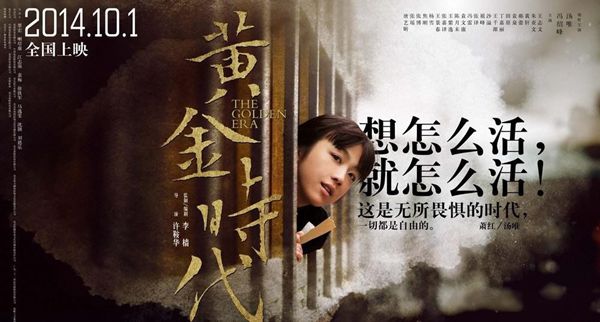'Golden Era': Ann Hui's art house experiment
- By Zhang Rui
 0 Comment(s)
0 Comment(s) Print
Print E-mail China.org.cn, September 30, 2014
E-mail China.org.cn, September 30, 2014
|
A poster for "The Golden Era." [China.org.cn] |
"The Golden Era," one of the most anticipated Chinese films of the upcoming Chinese National Holiday film season, premiered in Beijing on Sunday, but left audiences with mixed feelings.
The 3-hour-long epic, directed by Ann Hui, is centered on the life story of Xiao Hong, a female writer in the era of the War of Resistance Against Japanese Aggression before the People’s Republic of China was founded in 1949. After drifting around China for years, Xiao Hong, whose real name was Zhang Naiying, died at the age of 30 in early 1942, during the chaos of wartime in a temporary hospital at St. Stephen's Girls' College in Hong Kong.
Hui directed the arthouse biopic, recruiting actors Tang Wei and Feng Shaofeng to play Xiao Hong and her lover Xiao Jun, another important writer in 20th century China. Compared with Hui's masterpiece, the 2011 feature "A Simple Life," the sprawling historical biopic "The Golden Era" should be her most expensive and most ambitious project yet.
At the premiere, Hui admitted that "The Golden Era" is an arthouse experiment, in which she adopted some new approaches to motion picture storytelling, such as when actors in character suddenly talk to the camera while on screen, as if they were talking to audiences as narrator, or as if they were giving interviews. This constantly rouses viewers to remind themselves that they are watching a film, unlike more mainstream productions which allow audiences to immerse themselves in a dream created by filmmakers.
The film also tries to mix time and space, screen writer Li Qiang said, and leaves space for audiences to imagine and form ideas and images of Xiao Hong. Li integrated as many original texts written by Xiao Hong as he could into his script, and he said that Xiao Hong's works are everywhere in the movie. Even the title, "The Golden Era," comes from a love letter she wrote to Xiao Jun.
Although Xiao Hong was clearly not in any golden era, but suffered from serious illness and heartbreak, Li explained, "Maybe the fact that she was free to do what she wanted made it a golden era for her." Actress Tang Wei also said she agreed with this interpretation.
"The Golden Era" has received mixed reviews since it was screened out of competition at the 71st Venice International Film Festival, not only due to its delicacy and length, but also due to its oppressively linear style, even though the film seems to have no climax and is absolutely not an action-packed blockbuster.
A review from Variety reads, "Seemingly caught between a daring impressionistic approach and a pedantic recital of dates and locations, this three-hour endurance test is marked by sincere adoration of its subject, played with gleaming intelligence by Tang Wei."
"The Golden Era" has been selected as the Hong Kong entry for Best Foreign Language Film at the 87th Academy Awards. It will open in China on Oct. 1, 2014, China's 65th National Day holiday.







Go to Forum >>0 Comment(s)